France is celebrated for its rich culture and high standard of living. Although the cost of living in France is generally high, the country offers a diverse range of living expenses depending on the region. For example, Paris is among the top ten most expensive cities globally, but living expenses in Nantes are much lower, with rent being under half the price of those in Paris1. Whether you’re relocating for work or study, understanding and managing your living expenses in France is essential.
The basic cost of living in Paris includes about €1,085 per month for a one-bedroom apartment in the city center, €50 for lunch for two, and €73 for transportation1. Additionally, the average rent for a one-bedroom apartment across France is €5552. The diversity in France lifestyle costs means that you can find ways to budget effectively, whether you’re residing in bustling urban areas or serene rural locales.
Compared to the U.S., the France living costs are generally 24% cheaper, making it a more affordable option for expatriates3. Specifically, monthly grocery expenses in France are estimated to be between INR 4,300 and 8,600, whereas in the USA, they can range from INR 3,500 to 10,5003. Therefore, effective budgeting in France is crucial for a comfortable lifestyle.
For those interested in financing property in France, various options are available to both residents and foreigners. Understanding mortgage trends and exploring loan-to-value rates can help potential investors make informed decisions when investing in the French real estate market1.
Key Takeaways
- Paris is among the top ten most expensive cities in the world1.
- Rent in Nantes is under half the price compared to Paris city center apartments1.
- Basic living costs in Paris: €1,085 for rent, €50 for lunch for two, €73 for transportation per month1.
- France’s cost of living is 24% cheaper compared to the USA3.
- Rent for a one-bedroom apartment in France averages €555 per month2.
Contact us if you are Interested in Buying Property Abroad!
Overview of the Cost of Living in France
The cost of living in France varies significantly between cities, largely influenced by factors such as location, lifestyle, and income. Understanding these differences is essential for anyone considering moving to or traveling within the country, enabling better budget planning and expense management.
Comparing Popular Cities
French cities comparison reveals that Paris is notably the most expensive, followed by Lyon and Nice. The average monthly expenses in major French cities, excluding rent, range from €792 to €1,0424. Paris ranks as the 2nd most expensive city globally, making the cost of living in the capital considerably high, with a single person’s monthly expenses averaging €2,2004. In comparison, Bordeaux and Marseille offer more affordable living costs.
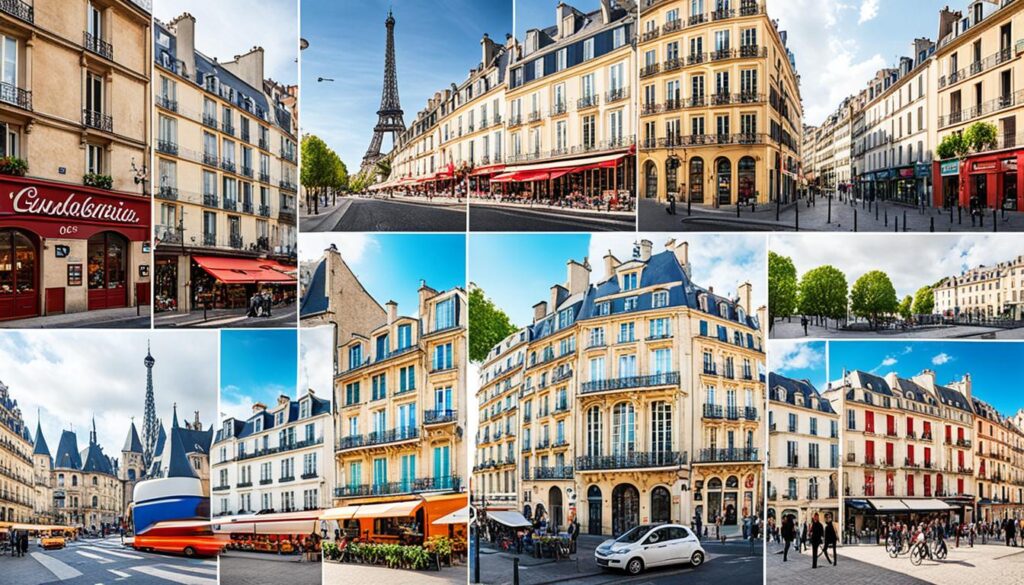
Average Monthly Expenses
To manage monthly expenses in France effectively, it is crucial to account for accommodation, food, utilities, and transportation. Average grocery expenditure ranges from €250 to €300 per week4, while utility costs per month include €40 for water, €79 for electricity, €70 for gas, and €30 for the internet4. These costs highlight the need for strategic budgeting to cope with the high living standards in France.
France vs Other Countries
When comparing the cost of living France vs. UK, both exhibit similar expenses, particularly in capital cities like Paris and London. However, the living cost in France vs. USA shows that France generally has lower housing prices by 34%5, but day-to-day expenses can be higher in certain categories, like food, which is 11% more expensive4. This comparison reveals how France’s cost of living measures up internationally, urging expatriates to carefully consider these differences when planning their move.
For additional insights on living costs and detailed statistics, you can check out the Numbeo Cost of Living in France4.
Cost of Accommodation in France
The cost of accommodation in France varies significantly across different regions, largely influenced by whether one chooses to reside in urban or rural areas. While Paris is renowned for its high rental prices, cities like Nantes and Marseille offer more budget-friendly alternatives.
Rental Prices in Major Cities
Rental prices in major French cities are notably diverse. In Paris, the monthly rent for a furnished 85 m² apartment in an expensive area is approximately €1,681, while in a more standard area, it decreases to around €1,4436. Correspondingly, smaller apartments like a furnished 45 m² studio cost about €1,017 in an upscale locality and €772 in a more typical area6. On average, rent prices in France remain lower than those in the USA, with French rents being about 37.67% cheaper7.
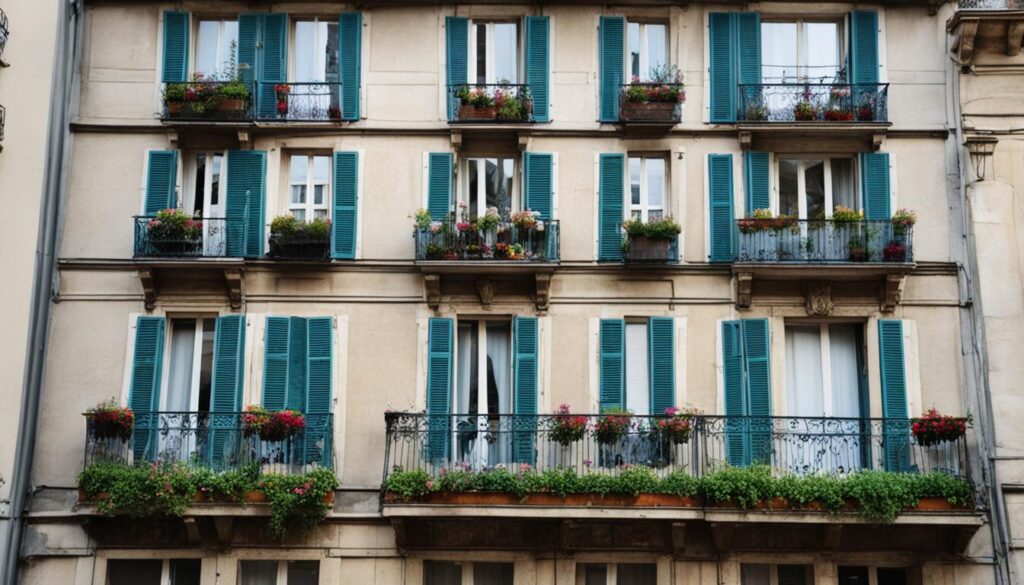
Differences Between Urban and Rural Areas
The disparities in the cost of accommodation in France between urban and rural areas are pronounced. Urban areas, especially major cities, tend to have higher rents due to increased demand and limited space. Conversely, rural areas offer more affordable options, making them attractive for those looking for cost-effective living solutions. For example, the average rent for a one-bedroom apartment in the city center is €659, while outside the city center, it drops to €5147.
Renting Tips for Expats
For expats entering the France rental market, preparation is key. Begin the search early and consider the type of accommodation carefully since prices can differ significantly between a private room and a full apartment. Utilities may or may not be included in the rent, which necessitates budgeting for additional expenses separately. For instance, utilities for a month for two people in an 85m² flat are around €1976, and for one person in a 45m² studio, they amount to approximately €1326. A thorough research process is crucial to finding accommodations that align with both needs and budget. For those interested in understanding property financing options in the UK, a deeper dive into mortgage rates and schemes can be explored here6.
Utility Costs in France
Understanding the utility expenses in France can help newcomers manage their budgets efficiently. On average, basic utilities like electricity, heating, cooling, water, and refuse collection cost around €138.95 per month for a standard household8. Internet services, typically offering speeds of 60 Mbps, add approximately €27.56 to the monthly utilities in France8.
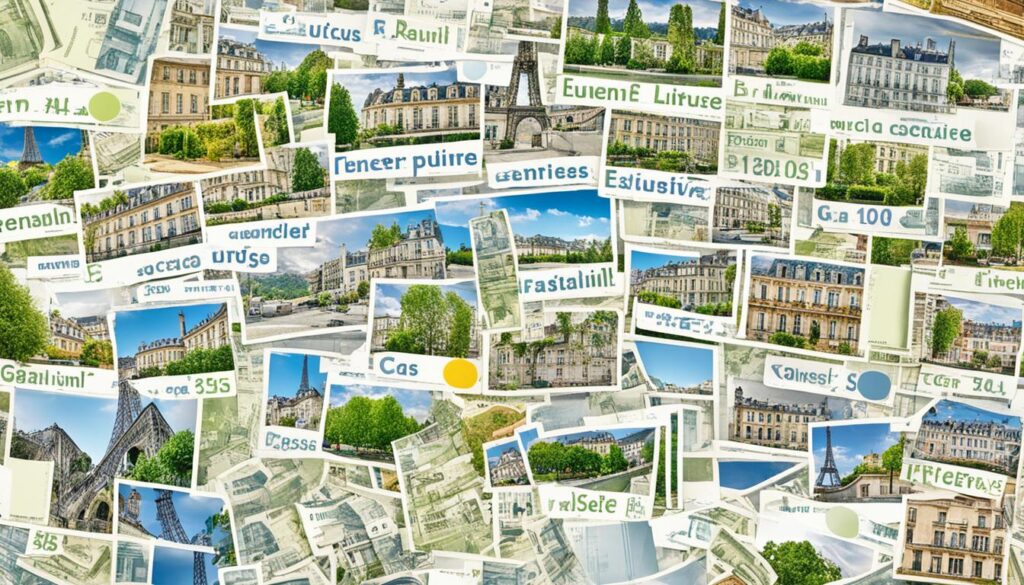
Average Monthly Utility Expenses
The cost of utilities in France can vary depending on the size of the apartment and its location. For a 1-bedroom apartment, the average monthly utility expenses can amount to €1899. These expenses include essential services such as electricity and internet. Paris, Lyon, and Toulouse, which are listed as some of the most expensive expat cities, also reflect higher utility costs9.
Tips to Save on Utility Costs
Many individuals and families are keen on saving on utilities in France. Here are a few practical tips to achieve this:
- Consider renting accommodations that include fixed utility costs. This approach can offer predictable expenses and help you stay within your budget.
- Utilize energy-efficient appliances. While the initial investment might be higher, these appliances often lead to significant savings over time.
- Be vigilant about your energy usage. Simple habits such as turning off lights when not in use or unplugging devices can prevent unnecessary expenses.
For those planning long-term stays, knowing the various monthly utilities France can help in making informed decisions. With strategic planning and energy-conscious habits, managing utility expenses in France becomes more manageable and cost-effective.
Average Cost of Groceries in France
Grocery shopping in France can be a significant part of your monthly budget. Understanding the average cost of groceries in France is crucial for effective financial planning and budgeting. In this section, we’ll explore food pricing in different cities and offer tips for budget-conscious shoppers.
Price Comparison by City
The average cost of groceries in France can vary considerably based on the city. For instance, in Paris, you might find products like milk priced at €1.04 per liter and a loaf of bread at €1.46 for 500g. Similarly, essential items like eggs are priced at €3.04 for a dozen, while local cheese costs about €6.74 for 500g10. The cost for chicken breasts (boneless, skinless) stands at approximately €5.71 for 500g, whereas beef round (or back leg red meat) is around €9.37 for the same quantity10. Fruits and vegetables such as apples and tomatoes are priced at around €1.28 and €1.35 per 500g, respectively10.
In comparison, other cities in France might have slightly lower or higher prices. For example, in smaller cities, the cost of a loaf of fresh white bread might be closer to €1.00, while in larger cities, prices might align more with those in Paris11. To get a comprehensive overview of the cost of living in France—including groceries, housing, and other essentials—visit this guide.
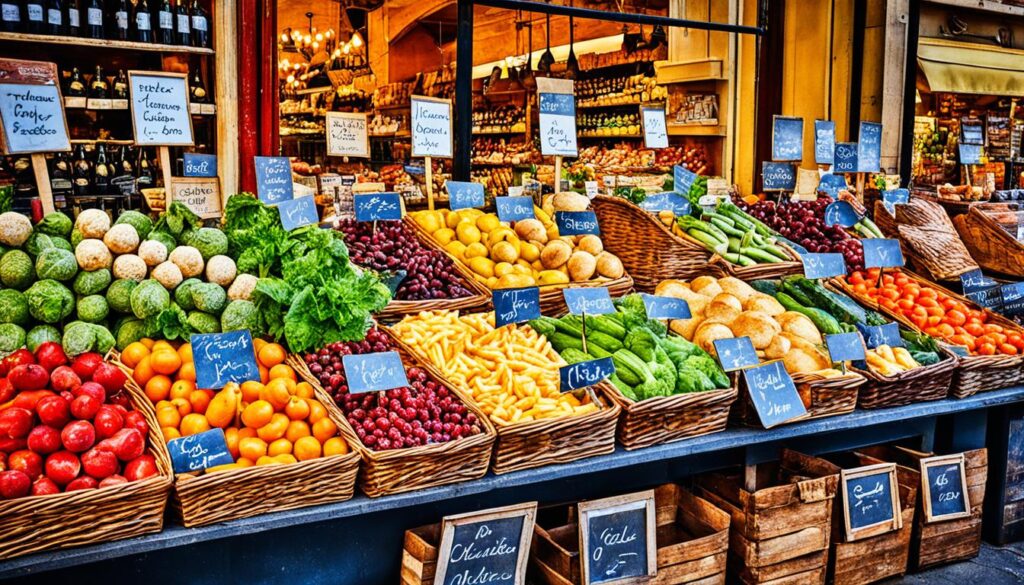
Shopping Tips for Budget-Conscious Shoppers
For budget-conscious shoppers looking to manage their food expenses, there are a few strategies to consider for budget grocery shopping in France:
- Shop at Discount Stores: Stores like Lidl and Aldi often offer lower prices on various food items compared to premium supermarkets. Discount stores are a great way to save on your grocery bill.
- Buy Local and Seasonal: Local markets and seasonal produce can be significantly cheaper. This approach not only helps in cutting costs but also ensures fresher and better-quality products.
- Use Loyalty Programs: Many supermarket chains such as Carrefour offer loyalty programs that provide discounts and special offers. Utilizing these can help save money in the long run.
- Plan Your Meals: Planning meals ahead of time and creating a shopping list can prevent impulse purchases and ensure you only buy what you need, reducing waste and saving money.
By following these tips, you can enjoy a more cost-effective approach to grocery shopping, ensuring you stick to your budget while still enjoying high-quality food. Remember, balancing your shopping habits between larger chains, local produce, and discount stores can make a significant difference in managing the average cost of groceries in France11.
Contact us if you are Interested in Buying Property Abroad!
Cost of Transportation in France
Transportation expenses in France can vary widely depending on the city and the mode of transport. Generally, public transport in France is an efficient and cost-effective option, especially in larger cities like Paris and Lyon. On the other hand, owning a car comes with its own set of challenges and costs, from gasoline to maintenance expenses, and parking fees.
Public Transport Costs
Public transport in France is both accessible and affordable. In big cities like Paris, a single trip costs around 1.50€ on average, and a monthly pass is priced at about 80€12. This makes public transport a convenient option for those looking to reduce their transportation expenses France. From buses and trams to regional trains, the French public transport network is extensive and well-connected.
Owning a Car in France
While public transport in France is efficient, some individuals may prefer the flexibility of owning a car. However, car ownership costs can be significant. Fuel prices are around 1.60€ per liter, and monthly expenses for gasoline, insurance, and parking can add up to approximately 150€12. These car ownership costs must be carefully considered, especially when factoring in additional maintenance and repair costs.
Tips for Reducing Transportation Expenses
To save on France transportation expenses, consider these useful tips:
- Utilize public transport options like buses, trams, and metro systems to avoid hefty car ownership costs.
- Take advantage of monthly passes or student and work-related discounts.
- Consider biking or walking for short distances to save on transportation expenses France.
- Choose accommodations with easy access to efficient public transit to further enhance France transportation savings.
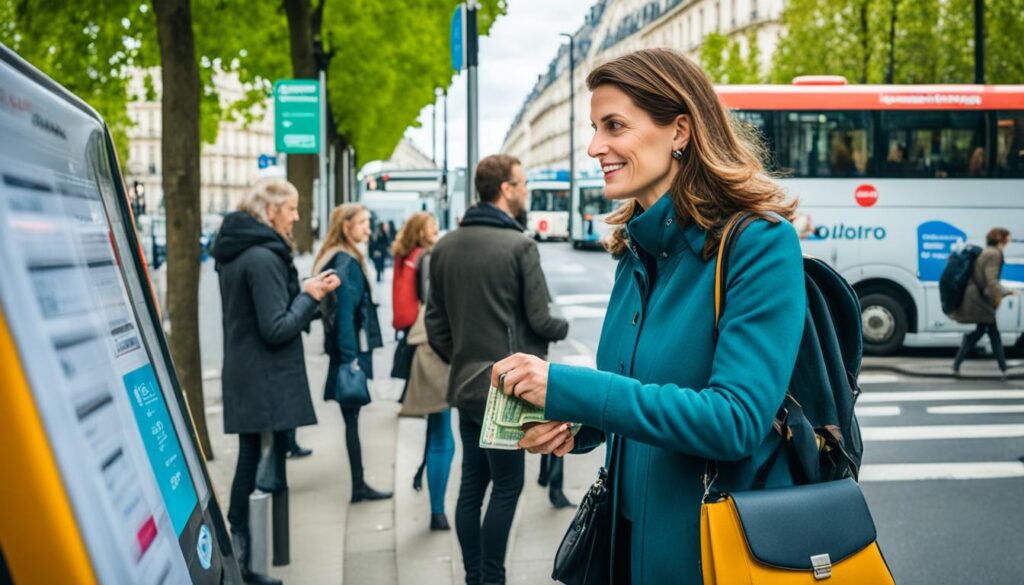
For those considering buying property in countries like Portugal, understanding local laws and tax obligations is essential. For more information on this topic, you can consult this resource.
Cost of Healthcare in France
Understanding the French healthcare expenses is vital for anyone planning to move to France. The French healthcare system covers an estimated 96% of all residents, including expatriates who have lived in the country for at least three consecutive months13. Residents have the option of the state system known as PUMA or private insurance for those seeking quicker access to medical services.
A significant portion of the France medical costs is covered by the government, with approximately 77% of costs for general practitioners, hospitals, dentists, and medicines being state-financed13. For instance, the fee to see a general practitioner is set at €25, while visiting a specialist costs €50 for those not enrolled in the public healthcare system14.
To give you a clearer picture, here is a comparison of healthcare fees:
| Type of Visit | Cost with Public Insurance | Cost without Public Insurance |
|---|---|---|
| General Practitioner | €7.50 | €25 ($27) |
| Specialist | €15 | €50 ($55) |
| Emergency Room (non-admission) | €18 | €18 |
Private insurance becomes critical for specific medical services and substantial out-of-pocket payments such as dentistry and vision13. The average cost of private health insurance is around 40 EUR per month, covering services that require more significant out-of-pocket expenditures like chiropractic, osteopathy, and psychological consultations15.
The co-pays in the French healthcare system are relatively low, with annual caps of about €50 for many residents, ensuring that medical expenses remain manageable13. Additionally, essential items such as glasses have been 100% reimbursed starting from 2020, and dental check-ups for kids are free every three years between ages 6 and 1815.
Healthcare expenses should be an important consideration when settling in France. Evaluating potential health insurance costs in France is crucial for budgeting purposes. Remember that most residents, 96%, carry private insurance alongside their public coverage, emphasizing the importance of comprehensive coverage1315. Whether using public or private insurance, France’s healthcare system provides thorough and comprehensive care for its residents.
Cost of Entertainment in France
Exploring the vibrant entertainment scene in France can be an exciting yet manageable part of your budget. Here’s a closer look at dining, leisure activities, and fashion shopping.
Dining Out
Dining costs in France offer a range of options. A meal at an inexpensive restaurant can cost between €15 to €17, varying by city, while a two-course dinner in a mid-range restaurant might set you back €35 to €38. In popular cities like Paris and Lyon, dining out can be a bit pricier. Inexpensive meals can range from $14.50 to $1816. The key to managing these dining costs in France is to explore both local bistros and upscale dining to experience a variety of flavors while staying within budget.
Leisure Activities
The scope of leisure and entertainment in France is vast and caters to all tastes. From playing golf, hiking the picturesque countryside to surfing on France’s stunning beaches, you can enjoy a host of activities at various price points. A movie ticket in Paris averages around €1217, while younger residents typically benefit from discounts or even free entries to museums and monuments17. Additionally, exploring regional market trends, like those highlighted in property financing, can help you discover affordable recreational spots in different areas of France. For more information on financing property, visit this link.
Shopping and Fashion
Shopping expenses encompass everything from local markets to high-end fashion boutiques. France lifestyle costs in the realm of fashion can vary widely based on where you shop. Major cities like Paris house luxury brands and designer stores that drive up shopping expenses, while smaller towns offer affordable yet stylish options. Monitoring shopping expenses means creating a balanced shopping experience, mixing visits to designer boutiques with local market hauls to adjust your wardrobe without straining your wallet.
Conclusion
Living in France offers a picturesque lifestyle rich in culture and diversity, which appeals to many expats and newcomers. While the cost of living can be high, particularly in major cities such as Paris where rent can range from €1,200 to €2,000 for a one-bedroom apartment18, careful financial planning for expats in France can ensure a comfortable experience. Opting for smaller cities like Bordeaux or Toulouse, which are significantly more affordable, can greatly aid in managing expenses in France19.
Effective budget-friendly living in France involves understanding the nuances of various expenses. For instance, the average cost for a primary care doctor’s visit is around €25, with patients paying roughly €7.50 out-of-pocket19. Additionally, public transportation is heavily subsidized by employers, covering 50% of employees’ monthly expenses19. One could also benefit from France’s unique work-life balance, supported by a 35-hour workweek and the right to disconnect outside office hours1918.
To further ease the transition, newcomers should explore comprehensive guides on specific topics, such as the cost of living in France and financial planning for expats in France. Delving into articles like this one could provide useful insights19. Additionally, understanding the fluctuations in property prices and financing options in other European countries, such as Spain, might shed light on broader financial considerations. For more detailed information, check resources like this article18.
With informed decisions and proactive budgeting, it’s possible to enjoy a high quality of life in France without feeling overwhelmed by costs. France’s vibrant expat community and strong social support systems further enhance the living experience, making it a worthy destination for those seeking both professional and personal fulfillment19.
Contact us if you are Interested in Buying Property Abroad!
FAQ
What is the general cost of living in France?
How do living expenses compare between different French cities?
How does the cost of living in France compare to other European countries?
What should I expect to pay for accommodation in France?
Are utility costs included in rent in France?
How much can I expect to spend on groceries in France?
What are the costs associated with transportation in France?
How does healthcare work in France, and what are the costs?
What are the entertainment costs in France?
Source Links
- https://wise.com/us/blog/cost-of-living-in-france
- https://frenchly.us/cost-of-living-in-france-vs-usa/
- https://leapscholar.com/blog/cost-of-living-in-france/
- https://housinganywhere.com/France/cost-of-living-france
- https://internationalliving.com/countries/france/cost-of-living-in-france/
- https://www.expatistan.com/cost-of-living/country/france
- https://businessculture.org/western-europe/business-culture-in-france/cost-of-living-in-france/
- https://www.anglofrenchremovals.co.uk/blog/cost-of-living-in-france
- https://www.expatarrivals.com/europe/france/cost-living-france
- https://www.psbedu.paris/en/paris-student-life/cost-living-paris
- https://www.mylifeelsewhere.com/cost-of-living/france/united-states
- https://visitukraine.today/blog/1165/cost-of-living-in-france-rent-food-and-transport
- https://www.internationalinsurance.com/health/systems/france.php
- https://internationalliving.com/countries/france/health/
- https://www.internations.org/france-expats/guide/healthcare
- https://www.internationalcitizens.com/living-abroad/costs/france/
- https://lavielocale.com/blog/2019/7/3/costoflivinginparis
- https://www.lexidy.com/blog/living-in-france-pros-and-cons/
- https://www.dabblinginjetlag.com/pros-and-cons-of-living-in-france/

Comments